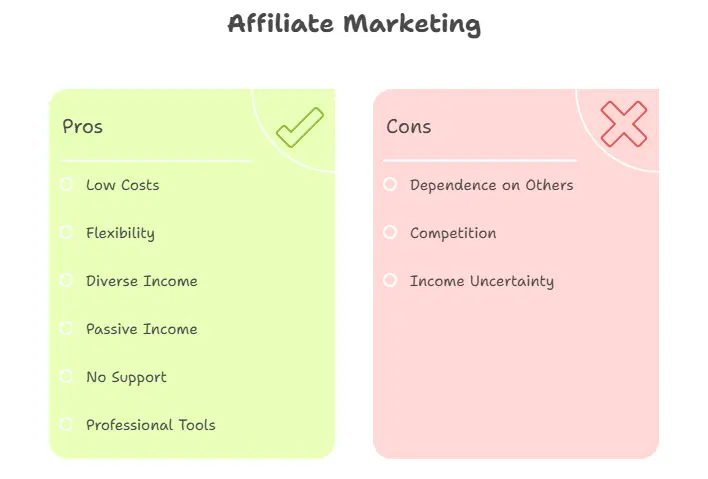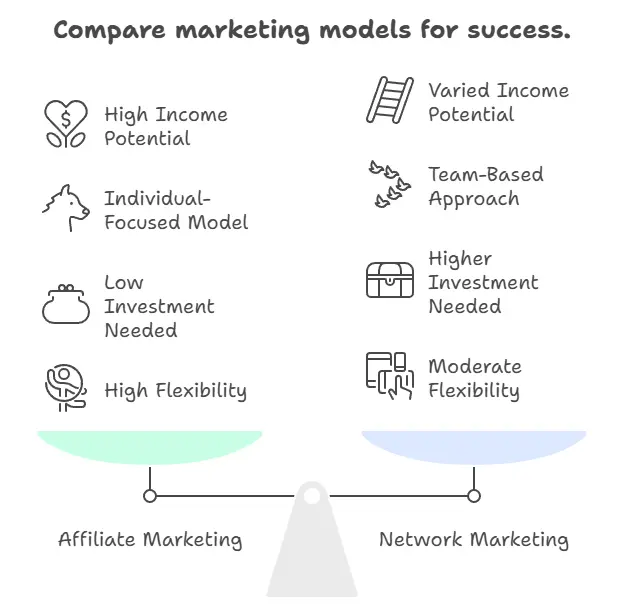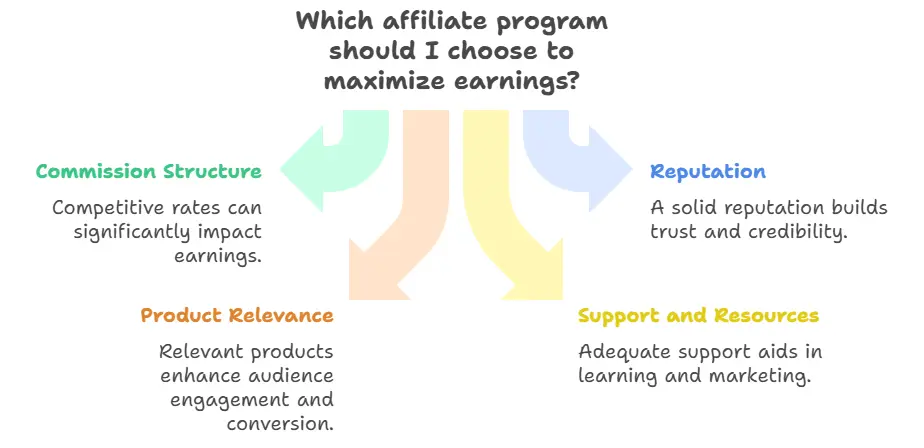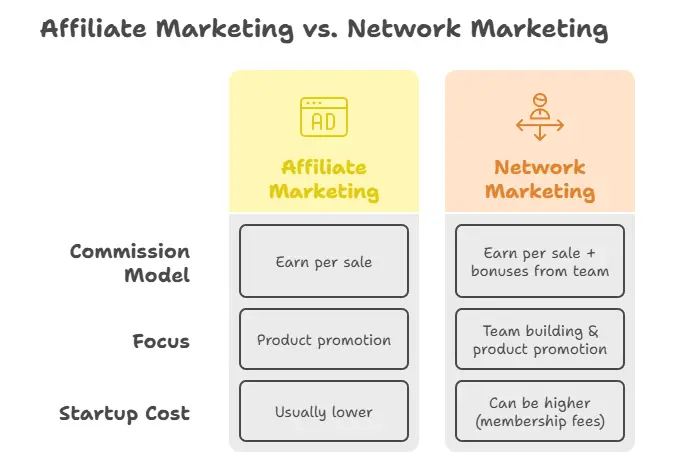 ATTENTION: Want to Learn Affiliate Marketing from Successful Affiliates?
Join this FREE community where successful marketers share their secrets!
Learn directly from highly successful affiliate marketers
Access free, actionable training content regularly
Connect with an active community of over 5,000 members
Network with multiple six-figure earning affiliates
Get your questions answered by real experts
JOIN FREE NOW!
ATTENTION: Want to Learn Affiliate Marketing from Successful Affiliates?
Join this FREE community where successful marketers share their secrets!
Learn directly from highly successful affiliate marketers
Access free, actionable training content regularly
Connect with an active community of over 5,000 members
Network with multiple six-figure earning affiliates
Get your questions answered by real experts
JOIN FREE NOW!
Understanding the differences and similarities between affiliate marketing and network marketing can help you identify the best path for earning money. Although both methods involve promoting products and earning commissions, their structures and strategies vary greatly. This article explores key aspects of each model, helping you make an informed decision.
Basic Definitions
Affiliate marketing is an online sales tactic that allows businesses to reward affiliates for each customer brought by their marketing efforts. Affiliates promote products on their websites or social media, often using unique tracking links. In contrast, network marketing, also known as multi-level marketing (MLM), is a business model where participants earn money through both their sales and the sales of their recruits, forming a network of individuals.
Key Similarities
- Both provide opportunities to earn passive income.
- Both rely on online marketing strategies, such as social media and email marketing.
- Both require building relationships with customers and prospects.
- Both involve sharing a product or service one believes in.
Distinct Differences
While they share similarities, Affiliate Marketing Vs Network Marketing differ in several ways:
1. Commission Structure
In affiliate marketing, you earn a commission for every sale made through your link. This encourages affiliates to focus on direct sales efforts. In network marketing, the commission is not only based on personal sales but also on sales made by the recruits you bring into the business. This means you can earn from multiple levels within your network.
2. Product Focus
Affiliate marketers typically promote products or services from multiple companies. This flexibility allows you to choose what aligns best with your audience. On the other hand, network marketers usually focus on a single company’s products, becoming brand ambassadors. This can limit choices but can strengthen your expertise in those specific offerings.
3. Business Model and Risk
Affiliate marketing is often seen as lower risk. You don’t need to invest in inventory or create your brand. You promote products and receive a commission. Conversely, network marketing involves a higher level of risk and commitment. You may need to invest in product inventory or pay initial fees, and success largely depends on recruiting others.
Profit Potential
Profit potential can significantly differ between the two models. Affiliate marketing can offer a more straightforward path to high earnings without the need to manage a team. With the right strategy, some affiliates make a six-figure income. In network marketing, earnings can be immense, but they can also be unpredictable. Success often relies on the depth of your network and your ability to recruit and motivate team members.
Time Commitment
Affiliate marketing can often be a more flexible option. You can choose your hours and workload. With effective automation, you can work part-time or full-time. In contrast, network marketing often requires more time, especially in the early stages. Building a team and mentoring your recruits takes dedicated effort.
Community and Support
Network marketing can create a strong sense of community. Being part of a team often provides mentorship and training. Many find this support encouraging. In affiliate marketing, you typically work independently, so the sense of community may be less pronounced unless you actively seek out networks or forums.
Getting Started
To enter affiliate marketing, you can start by creating a blog or social media account. Sign up for affiliate programs like Amazon Associates or ShareASale. For network marketing, research reputable companies such as Amway or Herbalife. Participate in their training programs to understand their products and recruit effectively.
Ultimately, both affiliate marketing and network marketing can be effective ways to earn income. Each has its strengths and challenges. Your choice should align with your skills, goals, and the time you can commit. Want to learn more? Check out resources on entrepreneur.com and shopify.com to delve deeper into the details.
Pros and Cons of Affiliate Marketing for Beginners

When diving into the world of online income, many beginners explore affiliate marketing as a way to earn money. Understanding the pros and cons can help you decide if this path is right for you. Let’s explore some critical benefits and challenges associated with affiliate marketing.
Pros of Affiliate Marketing
Affiliate marketing offers several advantages, making it appealing for newcomers. Here are some of the most notable perks:
- Low Start-Up Costs: Starting as an affiliate requires minimal investment. You don’t need to create a product or maintain inventory. Most of the initial costs revolve around building a website and promoting your content.
- Flexibility: You can work from anywhere and on your own schedule. This flexibility suits many beginners who may also have other job commitments.
- Diverse Income Sources: You can promote a variety of products from different companies. This diversification helps you find the right niche that resonates with your audience.
- Passive Income Potential: Once you create content and build your audience, the revenue can continue to flow with minimal ongoing effort. As people purchase through your affiliate links, you can earn money while you sleep.
- No Customer Support Required: Unlike traditional businesses, as an affiliate marketer, you aren’t responsible for customer service, returns, or complaints. The product owner manages these aspects for you.
- Access to Professional Tools: Many affiliate programs offer their partners advanced tools. These can include tracking software to see how well your links perform and advertising resources to help you promote products effectively.
Cons of Affiliate Marketing
While affiliate marketing sounds enticing, it does come with its challenges. Here are some cons to consider:
- Revenue is Never Guaranteed: Your income can fluctuate. Many factors, such as market demand and your audience’s interest in specific products, influence how much you earn.
- Dependence on Trust: Your credibility is tied to the products you promote. If a product fails to deliver, it can hurt your reputation and lessen your audience’s trust in your recommendations.
- Learning Curve: Beginners often face a steep learning curve. Understanding SEO, content marketing, and analytics can take time and effort to master.
- Competitive Market: Affiliate marketing is popular, meaning you’ll likely face stiff competition. Standing out requires unique strategies and consistent effort.
- Payout Thresholds: Some affiliate programs have a minimum payout threshold. It means you may have to earn a certain amount before receiving your first payment, which can be discouraging for new marketers.
Choosing the Right Affiliate Program
Selecting the right affiliate program is essential for success. Here are some considerations:
Criteria Description
Commission Structure Look for programs offering competitive commission rates, which can vary widely depending on the niche and products.
Reputation Research to ensure the affiliate program and products have a solid reputation. Forums and reviews can provide insights.
Product Relevance Choose products that resonate with your audience. Promoting relevant items can enhance trust and improve conversion rates.
Support and Resources Consider programs that offer training, marketing materials, and support. This assistance can be extremely valuable for beginners.
Getting Started
If you decide to jump into affiliate marketing, here’s a simple action plan for beginners:
- Identify your niche: Find what topics you are passionate about and where you can provide unique insights.
- Build a website or blog: Create a platform to share your content and affiliate links. Use WordPress or other user-friendly platforms.
- Join affiliate programs: Sign up for programs that fit your niche. Websites like Amazon Associates, ClickBank, and ShareASale are popular among beginners.
- Create valuable content: Write engaging blog posts, reviews, or tutorials that naturally incorporate your affiliate links.
- Promote your content: Use social media, email marketing, and SEO strategies to get your content in front of your audience.
Affiliate marketing offers a promising avenue for beginners to earn income online. By weighing the pros and cons, you can make an informed decision about whether this path aligns with your goals and capabilities.
Exploring the Compensation Structures in Network Marketing
When diving into the world of network marketing, understanding the compensation structures is crucial for anyone looking to succeed in this industry. Different companies have unique compensation plans that reward distributors in various ways. These structures can greatly influence your potential earnings and overall success. Below, we will explore the key components of network marketing compensation plans.
Types of Compensation Plans
Network marketing companies typically adopt one of several common compensation structures. Each plan has distinct features that cater to different types of distributors. Here’s a look at the most popular types:
- Binary Plan: In a binary compensation plan, each distributor builds two legs or downlines. Earnings come from the performance of both legs, with a focus on balancing them to maximize commissions.
- Unilevel Plan: This structure allows distributors to recruit an unlimited number of people on their first level. Commissions can be earned on multiple levels, but often at a decreasing percentage as you go deeper.
- Matrix Plan: A matrix compensation plan creates a defined structure or grid. For example, a 3×3 matrix allows three distributors on the first level and three on the second level. It’s often limitative but can encourage teamwork.
- Hybrids: Many companies merge different structures to form hybrid plans. This flexibility can mix both binary and unilevel elements, allowing potential for both wide and deep earnings.
Key Elements of Compensation Structures
Understanding the inner workings of these compensation structures is necessary for maximizing earnings. Here are crucial elements to consider:
| Criteria | Description |
|---|---|
| Commission Structure | Look for programs offering competitive commission rates, which can vary widely depending on the niche and products. |
| Reputation | Research to ensure the affiliate program and products have a solid reputation. Forums and reviews can provide insights. |
| Product Relevance | Choose products that resonate with your audience. Promoting relevant items can enhance trust and improve conversion rates. |
| Support and Resources | Consider programs that offer training, marketing materials, and support. This assistance can be extremely valuable for beginners. |
Factors Influencing Earnings
Several elements can influence how much a network marketer can earn. Engaging in certain strategies can improve your earnings significantly:
- Recruitment: Actively recruiting new distributors can turbocharge your potential income through team commissions and bonuses.
- Sales Skills: Improving your sales abilities can enhance your personal commissions and help your downline succeed.
- Training and Support: Access to training and support can improve retention rates within your team and increase overall sales.
- Product Quality: Promoting high-quality products typically leads to higher customer retention, which creates stable income streams.
Understanding Payout Schedules
Payout schedules determine how and when you receive your income. Most network marketing companies pay monthly, bi-weekly, or weekly. It’s essential to confirm the payout cycle to manage your cash flow effectively. Decisions on frequency and minimum payout conditions can impact your earnings. Therefore, ensure to read the specifics of your chosen company’s payout structure.
Challenges to Consider
While network marketing can be lucrative, there are challenges in navigating compensation structures:
- Complexity: Some compensation plans can be confusing, making it difficult to understand potential earnings.
- Market Saturation: In highly saturated markets, recruiting new members and selling products can become increasingly challenging.
- Attrition Rates: High dropout rates can diminish your team’s potential and income.
To improve your understanding of network marketing opportunities, you can explore more resources like Network Marketing Pro, which provides insights into the industry. Mastering the various compensation structures in network marketing can empower you to make informed decisions. Besides, it can significantly elevate your potential for success in this dynamic industry. Always do thorough research before committing to a company to ensure that their compensation plan aligns with your goals.
How to Choose Between Affiliate Marketing and Network Marketing
When deciding between Affiliate Marketing and Network Marketing, it’s crucial to weigh the pros and cons of each approach. Both methods can provide lucrative opportunities, but they cater to different types of individuals and strategies. Let’s explore some key differences and considerations to help you make an informed choice.
Understanding Affiliate Marketing
Affiliate marketing involves promoting a company’s products or services and earning a commission for every sale made through your referral link. This model is typically straightforward, focusing on digital marketing techniques. Here are some aspects to consider:
- Simplicity: Getting started is relatively easy. You only need to sign up for an affiliate program, receive your unique links, and begin promoting the selected products.
- Flexibility: You can promote products across various platforms like blogs, social media, and email marketing.
- No Inventory: You don’t need to deal with product stocking or shipping logistics.
Exploring Network Marketing
Network marketing, also known as multi-level marketing (MLM), involves selling products directly to consumers while simultaneously building a network of distributors under you. This structure allows you to earn commissions on both your sales and your team’s sales. Here are the critical components:
- Team Building: Success often depends on your ability to recruit and support other marketers.
- Commission Structure: You might earn bonuses based on your team’s performance, which can lead to higher income potential strictly through multiplication of sales.
- Product Knowledge: A strong understanding of the products you promote is vital, as relationships and personal recommendations often drive sales.
Key Differences to Consider
| Feature | Affiliate Marketing | Network Marketing |
|---|---|---|
| Commission Model | Earn per sale | Earn per sale + bonuses from team |
| Focus | Product promotion | Team building & product promotion |
| Startup Cost | Usually lower | Can be higher (membership fees) |
Choosing Yours
Ultimately, your unique skills and preferences will steer your choice between affiliate marketing and network marketing. Here are some guiding questions to consider:
- What is your financial goal? Are you looking for a quick income or a long-term residual income?
- How comfortable are you with self-promotion and team management?
- Do you prefer a product focus or a recruitment focus?
- What type of marketing channels do you want to engage in?
Risks to Be Aware Of
Both affiliate and network marketing carry risks, and it’s wise to do thorough research before diving in. Affiliate marketing risks include low commissions and finding the right niche, while network marketing can involve tricky product returns and high turnover rates in teams. Always read the fine print and understand any fees or commitments.
Success Stories: Real-Life Examples from Affiliate and Network Marketers
In the dynamic world of online marketing, both affiliate marketing and network marketing have carved out significant niches. Each method not only offers individuals a way to earn money but also has its unique success stories that inspire others to dive into these lucrative ventures.
Success Stories in Affiliate Marketing
Affiliate marketing allows individuals to earn commissions by promoting products or services of various companies. Here are a few standout stories of individuals who transformed their lives through affiliate marketing:
- Pat Flynn – Once an architect, Pat found himself laid off in 2008. He started his blog, Smart Passive Income, where he shared his journey and strategies in earning passive income. Through affiliate marketing, his income skyrocketed from $7,000 in a single month to six figures annually, partnering with companies like Bluehost and Leadpages.
- Michelle Schroeder-Gardner – Starting her site Making Sense of Cents as a personal finance blog, Michelle capitalized on affiliate marketing to earn over $100,000 per month. She became a successful educator in the field, proving that with the right strategy and relentless effort, anyone can turn their passion into profits.
- John Chow – John began his online journey with a blog that steadily grew his audience. Through affiliate marketing, he earned up to $40,000 a month by promoting various products and building an engaged community around his brand. His story reflects the potential affiliate marketing has when one provides value to their audience.
Success Stories in Network Marketing
Network marketing emphasizes building a team while promoting a certain product or service. Here are remarkable stories from individuals in this space:
- Eric Worre – A leader in the network marketing industry, Eric transitioned from a struggling businessman to a renowned expert. His book, Go Pro, aims to educate aspiring network marketers, demonstrating that success is achievable through perseverance and effective recruitment strategies.
- Sarah Robbins – Sarah built a successful network marketing team through consistent recruitment and training efforts. With her platform Sarah Robbins, she shares techniques that helped her earn millions in revenue, helping thousands of others to replicate her success.
- Holton Buggs – Holton started with no prior experience and quickly climbed to the top in his network marketing company. He is now a speaker and mentor, showing others how network marketing can lead to financial freedom. His story emphasizes the importance of visionary leadership and unwavering determination in achieving success.
Comparing Affiliate and Network Marketing Success
Both affiliate and network marketing have compelling success stories, but the approaches differ. Here’s a comparison of their unique aspects:
| Aspect | Affiliate Marketing | Network Marketing |
|---|---|---|
| Income Potential | High, depending on traffic and conversions | Varied, based on team performance and product sales |
| Business Model | Primarily individual-focused | Team-based approach |
| Investment Needed | Low (mainly website and marketing tools) | Can be higher (start-up costs and training) |
| Flexibility | High (promote multiple products) | Moderate (focus on specific company products) |

Each model offers opportunities for exciting success, but choosing between affiliate marketing and network marketing really depends on individual preferences, skills, and resources. Whether opting to go solo in affiliate marketing or build a team in network marketing, the stories shared above highlight the reality that dedication and the right strategies can lead to incredible financial success.


